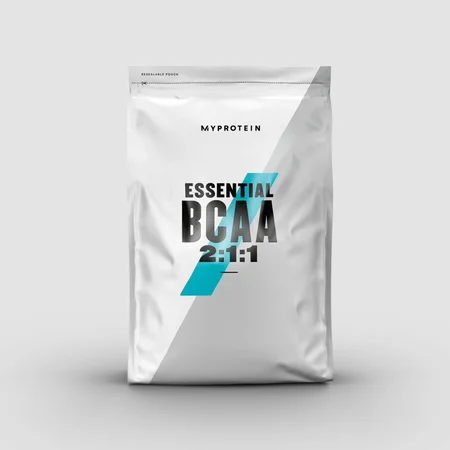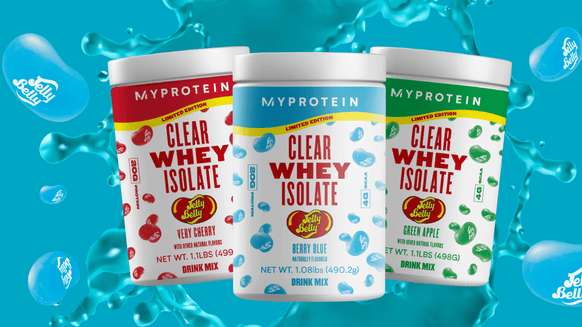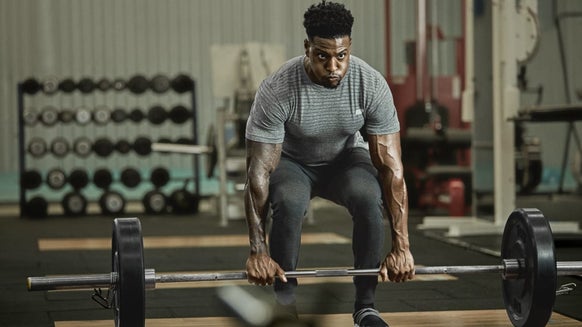
Pills, powders, shots, and bars — and what about BCAAs for women? There are so many supplements on the market that what you should be taking and why can be confusing – BCAAs are no exception. These essential amino acids could be the key to your workout success – a small scoop a day can improve endurance and resistance exercise performance, as well as help to enhance muscle mass and shred body fat.1,2,3
Still sceptical? Don’t worry, we’ve put together the key reasons why BCAAs could benefit you and your health and fitness goals.
In this article, you’ll find:

What are BCAA’s and how do they work?
BCAAs (Branched chain amino acids, made up of Leucine, Isoleucine, and Valine) are a classification of essential amino acids. As such, they can’t be synthesized by the body and must be obtained through the diet. Whether that’s through whole-food sources such as chicken, fish, milk, and beans, or through a dietary supplement, is up to you.
The majority of BCAAs are used up by skeletal muscle, where they’re involved in protein synthesis (muscle building), energy production, and various metabolic Processes. Most notably, BCAAs activate a key regulator in the synthesis of new proteins for muscle building.4 Currently, researchers and nutritionists are most interested in leucine, due to its potent ability to activate the mTOR signalling pathway and stimulate the greatest muscle protein synthesis (muscle building) response.5
This means that simply throwing in some BCAAs around your workout could see you reap extra rewards from all the hours sweated out in the gym.
The benefits of BCAA’s for women
1. Can assist with weight loss and lean mass
Changes to body composition are largely determined by the amount of energy consumed versus the amount expended (through exercise, thermogenesis, and basal metabolic rate). It’s commonly accepted that an energy surplus leads to weight gain, whereas an energy deficit leads to weight loss. However, where that energy comes from, particularly in relation to protein, can also tip the scales. Even the type of protein you consume could be influencing your results.
BCAAs alone have shown to be better than whey (a complete protein) at prompting gains in lean muscle mass and reducing body fat alongside resistance training in women.1 Increasing your lean muscle mass is not only beneficial for strength training, it also improves energy expenditure, bone strength, and cardiovascular health.6,7,8
BCAAs also have the added benefit of being low in carbohydrates, fat, and calories, with only 20 calories per 5g serving compared to the 100 calories found in one serving of whey protein. So, if you’re watching the scales, then BCAAs may be the better option for you.
If your goal is weight loss, you have probably ditched the snacking and upped the cardio — but are you worried about losing all your muscle gains? Here’s where BCAAs come in handy, as they help to preserve lean body mass even whilst in an energy deficit.9 So, you can hop back onto the treadmill without the fear of your quads disappearing before your eyes!
2. Can help to boost strength
Naturally, if you’re hitting the gym hard, you want to feel physical improvements, right? Well, BCAAs have certainly demonstrated their strength here. Adding BCAAs to your normal diet, when following a resistance training program, could boost you up a weight level.1
Even better, taking BCAAs before resistance exercise can reduce the severity of muscle damage incurred and achy muscles post-workout, or delayed onset muscle soreness (DOMS)10 – giving you no excuse for skipping your next session.
3. May improve endurance
Believe it or not, protein supplements are not only beneficial for maximizing strength and muscle gains — they also aid endurance performance. BCAAs can improve time-trial performance and time to exhaustion, meaning you can perform faster for longer, burning more calories and getting fitter in the process. 2,3
Researchers have proposed the “central fatigue hypothesis” to explain how BCAAs improve endurance performance. In a nutshell, they may reduce the amount of serotonin that’s produced in response to exercise. I know what you are thinking —serotonin is the ‘happy hormone’ so why would we want to reduce it? You’re right, but serotonin is also involved in sleep regulation and high levels of this hormone can lead to early fatigue.11 So, if you like to run fast and far, BCAAs are worth a try.
4. Could benefit your immune system
Intense, long-distance exercise is associated with suppression of the immune system, making you more susceptible to illness, such as the common cold. This partly explains why it takes your body several days or weeks to recover from an endurance event, like a marathon. Life is hectic enough and being run down is the last thing you want getting in the way of your workout and reaching your goals.
The good news is, taking BCAA supplements can give your immune system a helping hand by reducing the release of chemicals that cause inflammation, meanwhile, increasing the release of substances that fight off harmful bacteria and pathogens, getting you back up on your feet.12,13
Side effects
Currently, there are no known significant, adverse effects of taking BCAAs. However, like any supplement, there are a few things you should consider before taking them.
BCAAs might interfere with sleep. As mentioned earlier, BCAAs suppress the release of serotonin, which is normally elevated following exercise. Serotonin is involved in sleep regulation, so taking BCAAs late at night could make it harder to drift off.
BCAAs potentially affect blood glucose concentration. The control of blood sugar levels is particularly important before and after surgery. So, stop using BCAAs at least two weeks before a scheduled surgery.
The positive effects of BCAAs for women may only be apparent if dietary protein intake is insufficient. Since BCAAs are contained within whole-food sources of protein, consuming additional amounts through a supplement may not produce any further benefits if you’re meeting your daily protein requirements.

Dosage
When to take BCAAs
For the best results, take BCAAs before or after your workout to send your muscles into building mode. If you’re really trying to gain muscle mass, throw some in at breakfast or with a pre-bed snack — just don’t exceed the daily, safe upper limit of 550mg per kg of body mass (that’s about 33g a day for a 60kg female).15
BCAAs for Women FAQs
Will BCAAs turn me into she-Hulk? No. Whilst both men and women are capable of building muscle mass, men have a much greater potential of getting much bigger, due to the large amount of anabolic (muscle-building) testosterone they produce compared to women. Consuming 9g of BCAAs a day isn’t going to change that fact.
Do I need to take BCAAs with food? No. BCAAs can be taken on an empty stomach, which may actually aid their absorption. However, if you suffer any gastrointestinal symptoms (like nausea or cramps) this way, then try them alongside food.
Can I take BCAAs on rest days? Yes. BCAAs for women and men are not solely beneficial around training. Taking them on rest days can help meet your essential amino acid requirements and aid recovery.
Do I need BCAAs for cardio? No, they aren’t a necessity. However, consuming BCAAs during cardio (particularly fasted cardio) can help prevent muscle protein breakdown and preserve lean body mass.
Take home message
All things considered, BCAAs for women seem to be a worthwhile supplement to add to your health and fitness regime. 9g taken around your workout is safe and sufficient for most women. Though, if you’re highly active or have a poor dietary protein intake, you may need more.
Strength, speed, stamina, and super immunity are only a few of the key proven benefits of these essential amino acids for women. If these sound like your health and fitness goals, then BCAAs could be the supplement for you.

Alice Pearson is a UKVRN Registered Associate Nutritionist and UK Anti‐Doping accredited advisor, having obtained a Bachelor’s of Science in Nutrition and a Master’s of Science in Sport Nutrition. She has a specialist interest in the use of sports supplements for improving health, fitness, and sport performance. Alice has experience working with both amateur and elite athletes, including providing nutritional support to Tranmere Rovers FC and Newcastle Falcons Rugby Club. Her nutritional guidance is always supported by evidence‐based research, which she keeps up to date through continuing professional development and independent learning. In her spare time, Alice loves travelling, hitting the gym, and getting stuck into a good book. Find out more about Alice's story here.
1Stoppani, J., Scheett, T., Pena, J., Rudolph, C., & Charlebois, D. (2009). 2009 international society of sports nutrition conference and expo new orleans, la, USA. 14-15 june 2009. Abstracts. Journal of the International Society of Sports Nutrition, 6(1), 1–19. doi:10.1186/1550-2783-6-S1-P1
2Kephart, W.C., Wachs, T.D., Mac Thompson, R. et al. (2016). Ten weeks of branched-chain amino acid supplementation improves select performance and immunological variables in trained cyclists, Amino Acids, 48(3), 779-789. doi:10.1007/s00726-015-2125-8
3Mittleman, K.D., Ricci, M.R., & Bailey, S.P. (1998). Branched-chain amino acids prolong exercise during heat stress in men and women, Medicine and Science in Sports and Exercise, 30(1), 83-91. doi:10.1097/00005768-199801000-00012
4Holeček, M. (2018). Branched-chain amino acids in health and disease: metabolism, alterations in blood plasma, and as supplements. Nutrition & Metabolism, 15(33). doi:10.1186/s12986-018-0271-1
5Blomstrand, E., Eliasson, J., Karlsson, H., & Köhnke, R. (2006). Branched-Chain Amino Acids Activate Key Enzymes in Protein Synthesis after Physical Exercise. The Journal of Nutrition, 136(1), 269-273. doi:10.1093/jn/136.1.269S
6Müller, M.J., Enderle, J. & Bosy-Westphal. (2016). Changes in Energy Expenditure with Weight Gain and Weight Loss in Humans. Current Obesity Reports, 5(4), 413-423. doi:10.1007/s13679-016-0237-4
7Winther, A., Jørgensen, L., Ahmed, L.A., Christoffersen, T., Furberg, AS., Grimnes, G., Jorde, R., Nilsen, O.A., Dennison, E., & Emaus, N. (2018). Bone mineral density at the hip and its relation to fat mass and lean mass in adolescents: the Tromsø Study, Fit Futures. BMC Musculoskeletal Disorders, 19(21), doi:10.1186/s12891-018-1933-x
8Lee, D.H., Keum, N., Hu, F.B., Orav, J.E., Rimm, E.B., Willett, W.C., & Giovannucci, E.L. (2018). Predicted lean body mass, fat mass, and all cause and cause specific mortality in men: prospective US cohort study. BMJ, doi:10.1136/bmj.k2575
9Dudgeon, W.D., Kelley, E.P., & Scheett, T.P. (2016). In a single-blind, matched group design: branched-chain amino acid supplementation and resistance training maintains lean body mass during a caloric restricted diet, Journal of the International Society of Sports Nutrition, 13(1), doi:10.1186/s12970-015-0112-9
10Shimomura, Y., Inaguma, A., Watanabe, S., Yamamoto, Y., Muramatsu, Y., Bajotto, G., Sato, J., Shimomura, N., Kobayashi, H., & Mawatari, K. (2010). Branched-Chain Amino Acid Supplementation Before Squat Exercise and Delayed-Onset Muscle Soreness, International Journal of Sport Nutrition and Exercise Metabolism, 20(3), 236-244. doi:10.1123/ijsnem.20.3.236
11Gleeson, M. (2005). Interrelationship between Physical Activity and Branched-Chain Amino Acids, The Journal of Nutrition, 135(6), 1591-1595. doi:10.1093/jn/135.6.1591S
12Bassit, R.A., Sawada, L.A., Bacurau, R.F.P., et al. (2002) Branched-chain amino acid supplementation and the immune response of long-distance athletes, Nutrition, 18(5), 376-379. doi:10.1016/S0899-9007(02)00753-0
13Calder, P.C. (2006). Branched-Chain Amino Acids and Immunity, The Journal of Nutrition, 136(1), 288-293. doi:10.1093/jn/136.1.288S
14Elango, R., Chapman, K., Rafii, M., Ball, R.O., & Pencharz, P.B. (2012). Determination of the tolerable upper intake level of leucine in acute dietary studies in young men. American Journal of Clinical Nutrition, 96(4), 759-767. doi:10.3945/ajcn.111.024471
15Pencharz, P.B., Elango, R., Ball, R.O. (2012). Determination of the Tolerable Upper Intake Level of Leucine in Adult Men. The Journal of Nutrition, 142(12). 2220-2224. doi:10.3945/jn.112.160259








